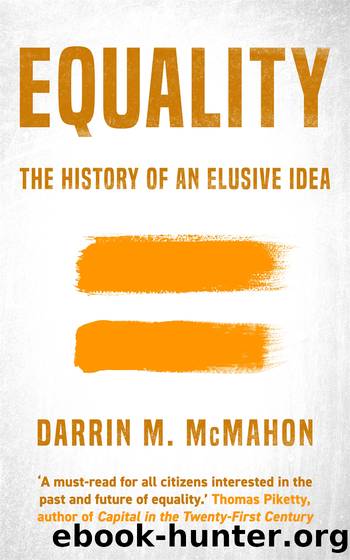Equality by Darrin M. McMahon

Author:Darrin M. McMahon
Language: eng
Format: epub
Publisher: ITHAKA
In his takedown of Proudhon, The Poverty of Philosophy, published the year before the Revolutions of 1848, Marx ridiculed the notion that âequality is the primordial intention, the mystical tendency, the providential aimâ of society. The overcoming of class struggle, rather, was historyâs ultimate end, and that was not at all the same thing. There is no evidence whatsoever, in fact, that Marx envisioned the coming communist state as one of material equality or fairness. And while it may be argued that he would surely have wanted to limit inequality when it impinged on freedom as it did in capitalist states, equality was not the communist goal, and still less was the kind of leveling that Marx and Engels associated with the crudeness and excess of Babeuf and the early utopians, and invariably described in pejorative terms as Gleichmacherei or Nivellierung.57
That is not to say that Marxism, where it was implemented, had no egalitarian consequences. It certainly did, reducing Gini coefficients where they can be measured, and providing opportunities for workers, women, and other hitherto excluded groups. But no less than the other ideologies examined in this book, it generated and thrived on exclusions. Class enemies were everywhere, useful in binding comrades together and keeping them on guard. The âbourgeoisâ and the âcapitalistâ proved even more elastic than the âaristocratâ of the French revolutionaries, and Marxists found more efficient means than the guillotine of cutting people down. In that sense they surely engaged in leveling. But egalitarian distribution was not their goal.58
Marxâs most important heirs understood such distinctions. Marx âtakes into account with the greatest accuracy the inevitable inequality of men,â Lenin observed in 1917. Mocking the âempty phrase mongering about equalityâ prevalent among his contemporaries, Lenin insisted, on the authority of Marx and Engels, that âthe concept of equality is a most absurd and stupid prejudice if it does not imply the abolition of classes.â âWe want to abolish classes, and in this sense we are for equality,â he acknowledged. âBut the claim that we want all men to be alike is just nonsenseââthe invention, as he put it, of âbourgeois professorsâ seeking to cast aspersions on genuine communists.59
Stalin, too, was doctrinaire in his interpretations, invoking Marx and Lenin together when he cracked down in the 1930s on equality mongering and what he considered excessive leveling (uravnilovka). It was necessary to pay skilled and unskilled laborers differently in the present stage of socialism, Stalin stressed, noting that âwhoever draws up wage scales on the principle of equality .â.â. is at loggerheads with Marxism and Leninism.â When, as Marx said in his Critique of the Gotha Program, the final stage of communism had been reached, Russians could live by the principle âfrom each according to ability, to each according to needs.â But until then the principle to be followed tended more in the direction of Saint-Simon. âFrom each according to his ability, to each according to his work,â was the subtle modification of the phrase that Stalin included in the Soviet Constitution of 1936.
Download
This site does not store any files on its server. We only index and link to content provided by other sites. Please contact the content providers to delete copyright contents if any and email us, we'll remove relevant links or contents immediately.
| Belgium | France |
| Germany | Great Britain |
| Greenland | Italy |
| Netherlands | Romania |
| Scandinavia |
Room 212 by Kate Stewart(5091)
The Crown by Robert Lacey(4791)
Endurance: Shackleton's Incredible Voyage by Alfred Lansing(4743)
The Iron Duke by The Iron Duke(4337)
The Rape of Nanking by Iris Chang(4189)
Joan of Arc by Mary Gordon(4080)
Killing England by Bill O'Reilly(3987)
Say Nothing by Patrick Radden Keefe(3965)
I'll Give You the Sun by Jandy Nelson(3417)
Shadow of Night by Deborah Harkness(3341)
Hitler's Monsters by Eric Kurlander(3320)
Mary, Queen of Scots, and the Murder of Lord Darnley by Alison Weir(3189)
Blood and Sand by Alex Von Tunzelmann(3181)
Eleanor & Park by Rainbow Rowell(3139)
Darkest Hour by Anthony McCarten(3112)
Margaret Thatcher: The Autobiography by Thatcher Margaret(3065)
Book of Life by Deborah Harkness(2913)
Red Famine: Stalin's War on Ukraine by Anne Applebaum(2909)
The One Memory of Flora Banks by Emily Barr(2847)
